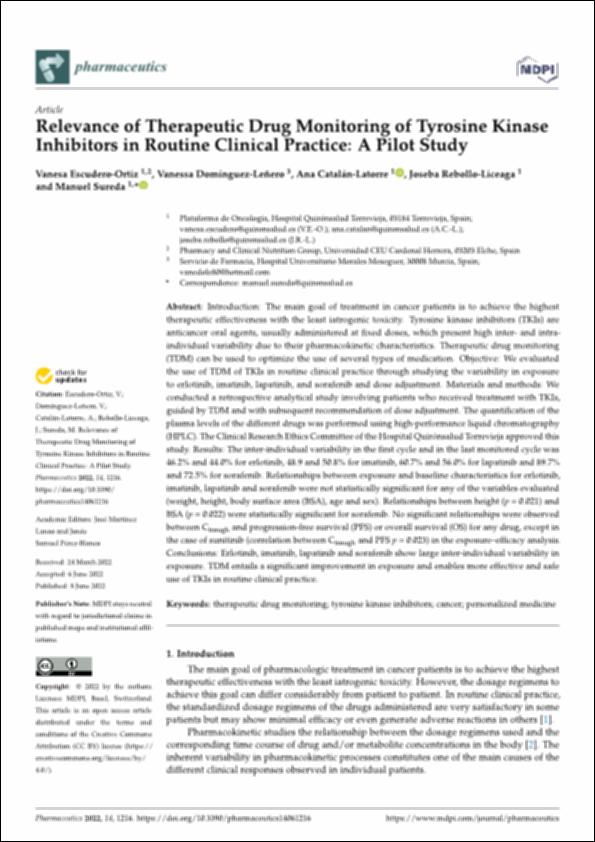Please use this identifier to cite or link to this item:
http://hdl.handle.net/10637/14344Relevance of therapeutic drug monitoring of Tyrosine Kinase inhibitors in routine clinical practice a pilot study
| Title: | Relevance of therapeutic drug monitoring of Tyrosine Kinase inhibitors in routine clinical practice a pilot study |
| Authors : | Escudero Ortiz, Vanesa Domínguez Leñero, Vanessa Catalán Latorre, Ana Rebollo Liceaga, Joseba Sureda González, Manuel |
| Keywords: | Medicamentos - Dosificación.; Drugs - Dosage.; Monitorización.; Enzimas - Inhibidores.; Enzyme inhibitors.; Tyrosine kinase - Inhibitors.; Cáncer - Farmacoterapia.; Patient monitoring.; Tirosina quinasa - Inhibidores.; Cancer - Chemotherapy. |
| Publisher: | MDPI |
| Citation: | Escudero-Ortiz, V., Domínguez-Leñero, V., Catalán-Latorre, A., Rebollo-Liceaga, J. & Sureda, M. (2022). Relevance of therapeutic drug monitoring of tyrosine kinase inhibitors in routine clinical practice: a pilot study. Pharmaceutics, vol. 14, i. 6 (08 jun.), art. 1216. DOI: https://doi.org/10.3390/pharmaceutics14061216 |
| Abstract: | Introduction: The main goal of treatment in cancer patients is to achieve the highest therapeutic effectiveness with the least iatrogenic toxicity. Tyrosine kinase inhibitors (TKIs) are anticancer oral agents, usually administered at fixed doses, which present high inter- and intraindividual variability due to their pharmacokinetic characteristics. Therapeutic drug monitoring (TDM) can be used to optimize the use of several types of medication. Objective: We evaluated the use of TDM of TKIs in routine clinical practice through studying the variability in exposure to erlotinib, imatinib, lapatinib, and sorafenib and dose adjustment. Materials and methods: We conducted a retrospective analytical study involving patients who received treatment with TKIs, guided by TDM and with subsequent recommendation of dose adjustment. The quantification of the plasma levels of the different drugs was performed using high-performance liquid chromatography (HPLC). The Clinical Research Ethics Committee of the Hospital Quirónsalud Torrevieja approved this study. Results: The inter-individual variability in the first cycle and in the last monitored cycle was 46.2% and 44.0% for erlotinib, 48.9 and 50.8% for imatinib, 60.7% and 56.0% for lapatinib and 89.7% and 72.5% for sorafenib. Relationships between exposure and baseline characteristics for erlotinib, imatinib, lapatinib and sorafenib were not statistically significant for any of the variables evaluated (weight, height, body surface area (BSA), age and sex). Relationships between height (p = 0.021) and BSA (p = 0.022) were statistically significant for sorafenib. No significant relationships were observed between Ctrough and progression-free survival (PFS) or overall survival (OS) for any drug, except in the case of sunitinib (correlation between Ctrough and PFS p = 0.023) in the exposure–efficacy analysis. Conclusions: Erlotinib, imatinib, lapatinib and sorafenib show large inter-individual variability in exposure. TDM entails a significant improvement in exposure and enables more effective and safe use of TKIs in routine clinical practice. |
| Description: | Este artículo se encuentra disponible en la siguiente URL: https://www.mdpi.com/1999-4923/14/6/1216 Este artículo de investigación pertenece al número especial "Model-Informed Precision Dosing". |
| URI: | http://hdl.handle.net/10637/14344 |
| Rights : | http://creativecommons.org/licenses/by/4.0/deed.es |
| ISSN: | 1999-4923 (Electrónico) |
| Language: | es |
| Issue Date: | 8-Jun-2022 |
| Center : | Universidad Cardenal Herrera-CEU |
| Appears in Collections: | Dpto. Ciencias Biomédicas |
Items in DSpace are protected by copyright, with all rights reserved, unless otherwise indicated.


